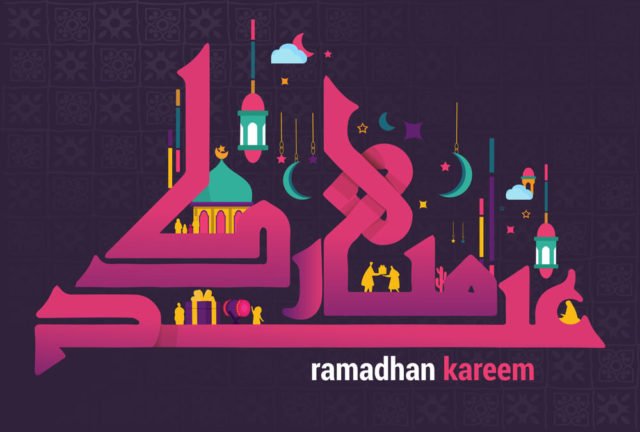Ramadan is the ninth month of the Islamic calendar. It is the Islamic month of fasting, in which Muslims refrain from eating, drinking from dawn until sunset. The month starts with the sighting of the crescent moon and consists of 29 or 30 days. According to Islamic beliefs, the devils (Shaitan) are chained at the start of this month, the doors of heaven are opened, and the doors of hell are closed. According to Islam, fasting is not just to be hungry all day but to learn self-control, patience, sacrifice, taqwa with spiritual and mental purification. Ramadan is a holy month of fasting, introspection, and prayer for Muslims, the followers of Islam.

Experience the bless Holy month:
The lateral meaning of “Ramadan” is “scorching heat or dryness”. The Quran also references the fasting of the believers of previous prophets and Muslims have faith in all prophets. The fast of Ramadan is among the pillars of the faith, Allah(SWT) has said in Quran-e-Majeed:
Oh, you who believe! Fasting is prescribed to you as it was prescribed to those before you, that you may learn piety and righteousness” (Q 2:183)
Ramadan was the month in which the first verses of the Qur’an were said to be revealed to the Prophet Muhammad (SAW). That was during a night that Muslims call Laylat al-Qadr (the night of decree or measures.). It is believed that this night is one of the odd nights from the last 10 days of Ramadan Kareem.

The Powerful Night (Laylat-ul-Qadar )
Laylat-ul-Qadar or Shab-e-Qadar is also known as the night of Power, Value, Destiny, and the night of Measures has its enormous blessings. Allah Almighty grants forgiveness and bliss to His believers and followers of Muhammad (PBUH) on this night.
As ALLAH says in Quran-e-Majeed:
“Surely, we sent it (the Qur’an) down on the Night of Ordainment. And what will make you know what the Night of Ordainment is? The Night of Ordainment is better than a thousand months. The Angels and the Spirit descend therein by their Lord’s leave for every affair. ~ Peace! It is until the rising of the dawn.” (Surat-al-Qadar)

Ramadan 2021: Quran Verses
“The month of Ramadan (is the month) in which the Qur’an has been sent down as guidance for mankind containing clear signs which lead (to the straight road) and distinguishing (the truth from falsehood).” (Q 2:185)
The Prophet (SAW) said:
“When the month of Ramadan starts, the gates of the heaven are opened and the gates of Hell are closed and the devils are chained.” (Imam Bukhari)
According to general Muslim belief shared by Shia and Sunni alike, the deeper purpose of fasting is understood as that of cultivating and reinforcing the spiritual and moral character of the faithful,
Who thus live a life of piety and balance, without forsaking the good things of this world bestowed by Allah’s grace (Qur’an 7:31-32).
Mercy to Muslim (Time to wake-up Call)
The emphasis on human character is especially underlined. A tradition of the Prophet’s beloved daughter, Hazrat Bibi Fatima Zahra asks what benefit accrues to one who fasts if one does not safeguard one’s tongue, ears, and limbs. This ethic of self-restraint echoes strictures of the Qur’an:
“The hearing, the sight, the heart – all of those shall be questioned.” (Qur’an 17:36).
Muslims are expected to practice self-restraint for the sake of Allah’s pleasure, remaining ever conscious of His presence. Such is truly God-fearing.
By fasting, you can feel the pain of needy people and of those who do not have such blessings of Allah. And Ramadan cannot be completed without helping others. Everyone tries to help their needy brother so they can also enjoy the happiness of ‘Eid.
Ramadan includes a month of fasting and charitable Actions
In Muslim tradition, Ramadan is a time of heightened commitment to piety and purification through special observances such as fasting, the performance of good deeds – including charitable giving and voluntary service – and through personal sacrifices of material comforts. These observances can lead to spiritual fulfillment and a sense of renewal.
Pakistan People With Big Heart
Pakistan in general and Karachi, in particular, have many non-government organizations (NGOs) that help poor, needy, and orphan people throughout the year and in Ramadan especially. People who are blessed with wealth help these organizations to their fullest. Some of the prominent organizations include Edhi Foundation, Chhipa Welfare Association, Saylani Welfare Trust, Alamgir Welfare Trust. Ansar Burney Welfare Trust, Khawaja Ghareeb Nawaz Welfare Trust., JDC Welfare Organization.
Although it seems that Muslims who kept fast eat less but the reality is opposite, the people do special arrangement for Suhor and Iftar. Therefore, many food brands and delivery services offer huge discounts and deal for people and use social media as tool for the marketing of their campaign.
Ramadan protection with COVID
As compared to the solar calendar, the dates of Ramadan vary, moving backward about ten days each year as it is a moving day depending on the moon. This year, Ramadan is different from previous years due to the outbreak of a terrible microscopic giant called coronavirus disease 2019 (COVID-19). The pandemic COVID-19 has made Ramadan very important this year because the virus has infected millions of people around the world and killed thousands, especially people with immunodeficiency. In dealing with COVID-19, maintaining good hygiene and supporting the immune system are effective, preventive approaches. Moderate exercise training and proper nutrition are the most important factors to support immune function.
Sehri and Iftar Timings:
April 14: Sehri – 4:35 AM, Iftar – 6:47 PM
April 15: Sehri – 4:34 AM, Iftar – 6:48 PM
April 16: Sehri – 4:32 AM, Iftar – 6:48 PM
April 17: Sehri – 4:31 AM, Iftar – 6:49 PM
April 18: Sehri – 4:30 AM, Iftar – 6:49 PM
April 19: Sehri – 4:29 AM, Iftar – 6:50 PM
April 20: Sehri – 4:27 AM, Iftar – 6:50 PM
April 21: Sehri – 4:26 AM, Iftar – 6:51 PM
April 22: Sehri – 4:25 AM, Iftar – 6:52 PM
April 23: Sehri – 4:24 AM, Iftar – 6:52 PM
April 24: Sehri – 4:23 AM, Iftar – 6:53 PM
April 25: Sehri – 4:22 AM, Iftar – 6:53 PM
April 26, Sehri – 4:20 AM, Iftar – 6:54 PM
April 27: Sehri – 4:19 AM, Iftar – 6:55 PM
April 28: Sehri – 4:18 AM, Iftar – 6:55 PM
April 29: Sehri – 4:17 AM, Iftar – 6:56 PM
April 30: Sehri – 4:16 AM, Iftar – 6:56 PM
May 1: Sehri – 4:15 AM, Iftar – 6:57 PM
May 2: Sehri – 4:14 AM, Iftar – 6:58 PM
May 3: Sehri – 4:13 AM, Iftar – 6:58 PM
May 4: Sehri – 4:12 AM, Iftar – 6:59 PM
May 5: Sehri – 4:11 AM, Iftar – 6:59 PM
May 6: Sehri – 4:10 AM, Iftar – 7:00 PM
May 7: Sehri – 4:09 AM, Iftar – 7:01 PM
May 8: Sehri – 4:08 AM, Iftar – 7:01 PM
May 9: Sehri – 4:07 AM, Iftar – 7:02 PM
May 10: Sehri – 4:06 AM, Iftar – 7:02 PM
May 11: Sehri – 4:05 AM, Iftar – 7:03 PM
May 12: Sehri – 4:04 AM, Iftar – 7:04 PM
May 13: Sehri – 4:03 AM, Iftar – 7:04 PM
A Month Of Duas & Forgiveness
Ramadan is a time for Muslims to fast for the sake of God and to offer more prayer than usual. During Ramadan, Muslims ask forgiveness for past sins, pray for guidance and help in refraining from everyday evils, and try to purify themselves through self-restraint and good deeds. People concentrate more on offering prayers and reciting the Quran to avail the forgiveness of Allah for their previous sins. Special arrangements are made in mosques for Sehr-o-Iftar and Namaz-e-Taraweeh. Special dishes are prepared for Sehar and Iftar. The fast is usually opened with dates or any juices. Housewives try to make both meals healthier by including healthy food items like fruits, juices, and yogurt. Ramadan ends with Eid ul-Fitr on the first of Shawwal, with much celebration and feasting.

Bolchaal is a platform of passionate writers who want to aspire others through the amazing ideas they have relating to our beloved homeland “Pakistan”.














